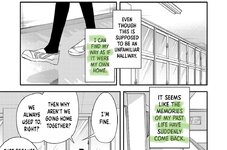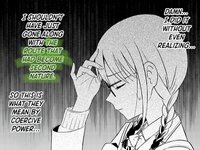You are using an out of date browser. It may not display this or other websites correctly.
You should upgrade or use an alternative browser.
You should upgrade or use an alternative browser.
Osananajimi no Watashi wa Mob de Itai no ni, Nazeka Heroine no Renai Taishou ni Natte Iru. - Vol. 1 Ch. 2
- Thread starter MangaDex
- Start date
Supporter
- Joined
- Jan 20, 2018
- Messages
- 68
This whole scenario is disturbing.
Did the original Suzuna's mind get erased from existence? Is she technically dead?
Also, the male protag is giving me the hunch that he himself may be a reincarnated, with how oddly pushy he is being.
Almost as if he is purposely trying to push routes to happen.
Yup. Fuck this girl. Oh, I just REPLACED A PERSON, and I'm gonna be judgy about a character's behavior even though they were designed that way. Either you accept that these are actually people with actual lives and can change, in which case you should accept that the relationship prior to your joining is valid and you have no right to just replace it, OR you treat them as characters who were made by forces outside of their control, in which case stop mistreating the dude for being "born" that way.
Such an apathetic character.
Dex-chan lover
- Joined
- Jan 8, 2023
- Messages
- 2,792
That's a joke?I still that the MC guy is the most tragic character in this. His entire life is falling apart and there's nothing he can do about it.
Dex-chan lover
- Joined
- Oct 20, 2018
- Messages
- 1,137
Yeah, given how self-centered the dude always was (and the shallowness he was always described to have), that level of observational keenness was uncanny. He's most likely also reincarnated and used the same factbook now!Suzuna did.
Group Leader
- Joined
- Jul 5, 2023
- Messages
- 426
I feel like some people here don't understand our reincarnated MC's situation.
They think she replaced the original, where in reality they combined. It's just that the previous life's memories are more prevalent, which I reckon is because her previous life was way more dramatic than her current life.
Here are the panels I'm basing my understanding of the current Suzuna on:






The thing is, we don't really know much about her past life. As far as I can tell, her past life's and current life's personalities are quite similar. Just that something happened in her past life that drove her to suicide.
Probably something related to romance with a male classmate, which didn't work out. Maybe a boy was into her and the girls who liked that boy bullied her. There's a hint of that since she is wary of how the gal's friends would react to her joining them for lunch. Other than that, we really have no clue so far.
Also, I see no indication that the MC of the dating sim is reincarnated as well. It's too early to jump to such a hypothesis. It's especially improbable because if he played the game, he'd know that his sister's cooking would improve if he gave her the attention she seeks.
They think she replaced the original, where in reality they combined. It's just that the previous life's memories are more prevalent, which I reckon is because her previous life was way more dramatic than her current life.
Here are the panels I'm basing my understanding of the current Suzuna on:






The thing is, we don't really know much about her past life. As far as I can tell, her past life's and current life's personalities are quite similar. Just that something happened in her past life that drove her to suicide.
Probably something related to romance with a male classmate, which didn't work out. Maybe a boy was into her and the girls who liked that boy bullied her. There's a hint of that since she is wary of how the gal's friends would react to her joining them for lunch. Other than that, we really have no clue so far.
Also, I see no indication that the MC of the dating sim is reincarnated as well. It's too early to jump to such a hypothesis. It's especially improbable because if he played the game, he'd know that his sister's cooking would improve if he gave her the attention she seeks.
Last edited:
Dex-chan lover
- Joined
- Jan 12, 2024
- Messages
- 156
I agree this seems more likely a fusion rather than a replacement.I feel like some people here don't understand our reincarnated MC's situation.
They think she replaced the original, where in reality they combined. It's just that the previous life's memories are more prevalent, which I reckon is because her previous life was way more dramatic than her current life.
Here are the panels I'm basing my understanding of the current Suzuna:
View attachment 19992View attachment 19995View attachment 19998View attachment 20001View attachment 20004View attachment 20007
The thing is, we don't really know much about her past life. As far as I can tell, her past life's and current life's personalities are quite similar. Just that something happened in her past life that drove her to suicide.
Probably something related to romance with a male classmate, which didn't work out. Maybe a boy was into her and the girls who liked that boy bullied her. There's a hint of that since she is wary of how the gal's friends would react to her joining them for lunch. Other than that, we really have no clue so far.
Also, I see no indication that the MC of the dating sim is reincarnated as well. It's too early to jump to such a hypothesis. It's especially improbable because if he played the game, he'd know that his sister's cooking would improve if he gave her the attention she seeks.
Dex-chan lover
- Joined
- Mar 20, 2019
- Messages
- 103
...So if you look at the first page of the first chapter, you'll get an idea of where her self-esteem is at.Why is she being so insistently stubborn on remaining dull and alone? It's not like she'll die
Dex-chan lover
- Joined
- Jul 16, 2019
- Messages
- 547
I like this observation, and you might be right. I'm trying hard not to overthink his behavior, but I'll admit that's probably because I knew people irl who behaved like this.Also, the male protag is giving me the hunch that he himself may be a reincarnated, with how oddly pushy he is being.
Almost as if he is purposely trying to push routes to happen.
- Joined
- Jan 29, 2025
- Messages
- 14
FINALLY
Dex-chan lover
- Joined
- Jul 16, 2019
- Messages
- 547
She's incredibly self-centered, but she also doesn't feel entitled to the affection and efforts of others. What's more is that she's a transactionalist, seeing what others give her as potential burdens to be repaid, so tries to opt out of such situations. She's nothing at all like Shindou even if they are both extremely self-centered.Calling someone else self centred from seemingly the most self centred character so far is real ironic.
Dex-chan lover
- Joined
- Mar 20, 2024
- Messages
- 494
He has never learnt cooking his lunches because he hasn't really been offered that option ever: in the flashback (on the 12th page) we see how insistent “old Suzuna” has been about him eating the bento she cooked for him, and thus he must have thought “why would I antagonize her over minor stuff?” and rather let himself remain ignorant about cooking his own lunches.If only there was another option he could take other than food poisoning or starving to deathlike buying his own lunch or learning to cook...
Not unlike his own sister, he technically can start cooking now and gradually improve.
Dex-chan lover
- Joined
- Mar 20, 2024
- Messages
- 494
Probably not considered “bad” at all in Japan — and in many other countries where, unlike sisters, first cousins are perfectly legal:Since the original version is an eroge, we see him "consummate" his relationship with said first cousin. Not as, "bad" as sister, but still close family.

(Also legal in Crimea for more than ten years, but this particular map won't tell you that — because of very obvious political reasons.)
Dex-chan lover
- Joined
- Mar 20, 2024
- Messages
- 494
We might treat the author's intention of writing a yuri subplot as an alternative clue: in her past life as well, Mashiro's unsuccessful romance might have been not with a male, but with a female classmate.something happened in her past life that drove her to suicide.
Probably something related to romance with a male classmate, which didn't work out. Maybe a boy was into her and the girls who liked that boy bullied her. There's a hint of that since she is wary of how the gal's friends would react to her joining them for lunch. Other than that, we really have no clue so far.
Though I have to agree that we need much better hints than these, preferably a few flashbacks about Mashiro's past life (and even those elements of her story would be almost inevitably plagued by the possibility of “an unreliable narrator” as its plot device).
Two reasons, really - one meta, one just depressing reality.Why is she being so insistently stubborn on remaining dull and alone? It's not like she'll die
Stuff like this is why these stories need a hundred chapters to gain any romantic progress
The meta reason is already answered by your question (and I'm sure you're aware of that) - it keeps the story going. And not just in the "let's milk this serialisation for as long as we can" sense, though it works out that way far too often . . . Broadly speaking, stories need some form of conflict, and some form of progression towards resolution of that conflict - things need to be bad in some way, and they need to change somehow as a result of the events in the story; in a story focused on an introverted and unhappy character, that progression normally comes from that character becoming less introverted and more happy. But if you've set your story up that way, as soon as they do become happy the story is basically done, so you need to find some way to keep them unhappy while you tell the story.
A story feeling like it's dragging on painfully is generally driven by a mismatch between the way the central conflict is framed, and how the progression towards resolution of that conflict is paced. If your story is focused on the unhappy character and the progression of that character is towards happiness, then the major arc of your story is tightly constrained by the gap between the focus character's unhappy state and their happy state, along with the things that drive their unhappy state. A small gap can make a nice short story; a massive and literally insurmountable gap can be the foundation for a tragic saga; whatever the case, the pacing of that progression is key. This is complicated by differences in the way people judge the significance of the gap and the drivers for it - particularly for stories focused on interpersonal relationships on a small scale, one person's massive critical life-changing issue is another person's meh (smaller, more tightly focused stories that happen to focus on unusual conflicts are often relegated to niche audiences because of that). Regardless, mismanaging the progress towards resolution of the core conflict is probably the biggest failing in storytelling, and avoiding it is one of the hardest parts of creating stories (the hardest by far being naming your characters, of course).
The depressing reality reason is just plain depressing, though: people with mental health issues (which is very much the case with this MC) pretty much always find it extraordinarily difficult to change their way of thinking. That's pretty much the definition of mental health issues, after all - modes of thinking that are harmful to you (and potentially those around you), which you have little to no control over. Most storytelling will avoid dealing with this kind of thing realistically, because it totally fucks up the progression of the story - how can you tell a satisfying story about a character who's constantly taking one or two steps forward only to slide back into their hole again, often for no readily visible reason?
It's hard, but when it's done well it can be extremely rewarding, and it's something that's important to see, even in stories where it's not the main focus (which would normally be the case for something like this) - people who are trapped by their mental health issues are often in that position because they can't see any way out; seeing a realistic portrayal of characters they can identify with actually being able to move forward and find a better life can make a big difference.
We're currently only two chapters into the story, so it's hard to know how this will progress. It's piqued my interest, though, and the hints of darkness (the falling body from the first chapter, for example) make me hopeful that it will take the harder but more interesting and rewarding path . . .
Similar threads
- 109
- Replies
- 110
- Views
- 61
- Replies
- 62
- Views
- 68
- Replies
- 69
- Views
- 85
- Replies
- 86
- Views
Users who are viewing this thread
Total: 2 (members: 0, guests: 2)